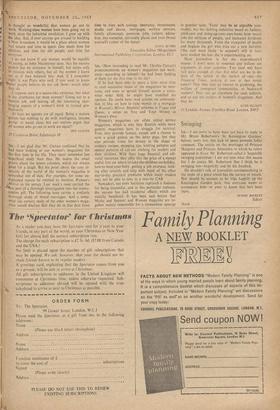Sin,—How interesting to read Mr. Charles Curran's pronouncements on women's
magazines last week, since—according to himself—he had been looking at them for the first time in his life!
If he had been able to spare a little more time to read successive issues of the magazines he men- tions, and even to spread himself across a some- what wider field, he might have modified his opinion. He could have read articles on contracep- tion in She, on how to raise money or a mortgage in Woman's Mirror, financial columns in Vogue and Queen, a series on You and Your Money in Women's Own.
Women's magazines are often called service magazines, which is why they flourish while more general magazines have to struggle for survival. True, they provide fantasy, escape and a chance to earn a quick guinea on the letter page, but they also provide value for money in the shape of cookery recipes, shopping tips, knitting patterns and special patterns of cut-out clothing for readers and their children. With their huge financial and edi- torial resources, they offer (for the price of a stamp) useful lists on where-td-take-the-children-on-holiday, how-to-feed-your-baby, getting a job overseas, look- ing after invalids and help with many of the other day-to-day practical problems which many readers may not be able to take to a near-by CAB.
Nowadays, not even Socialists reproach a business for being successful, and in this particular instance, the success has had incidental effects which are socially beneficial. It has been said before that Marks and Spencer and Woman magazine are to- gether mainly responsible for a tremendous upsurge
in popular taste. 'Taste' may be an arguable com- modity, but the thriving industries based on fashion, child-care and doing-up-your-own-home have meant jobs for millions of people, and increased dividends for many thousands. From the viewpoint of health and hygiene the girl who tries out a new hairstyle ('the curl most likely to succeed') will at least have washed the hair she is experimenting on.
Mass journalism is for the mass-educated masses. I don't want to resurrect any tedious sex arguments in your columns. You (and we) have had quite enough of that. But what are we to de- duce of the nature of the readers of—say--the Financial Times, looking at one or two recent issues? That they lack an interest in gardening, the welfare of immigrant communities, or backward readers? They can go elsewhere for such subjects, and so can the readers of women's magazines. And they do.


















































 Previous page
Previous page